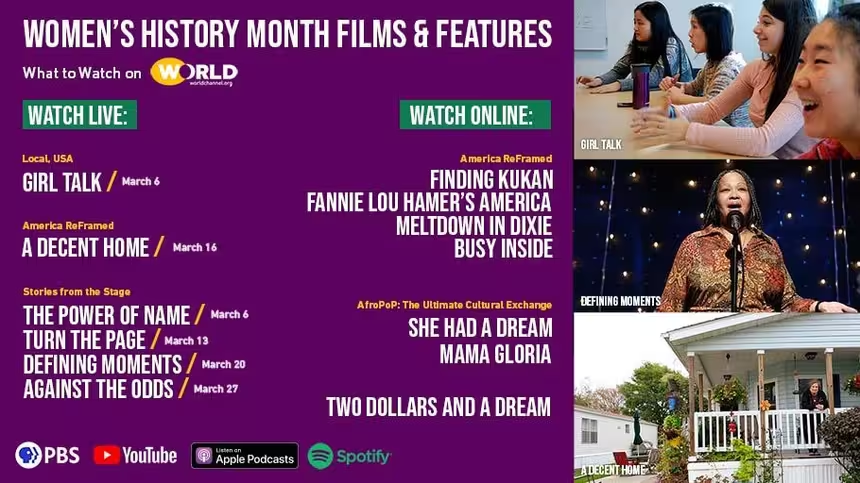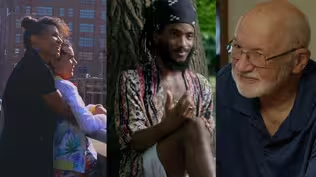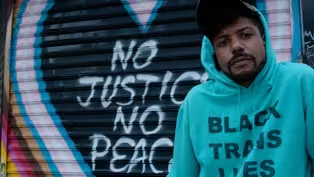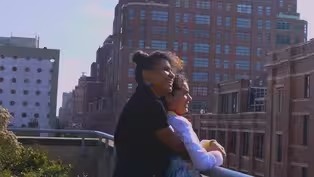WORLD Channel
The Conversation Remix: Good White People
Special | 11m 26sVideo has Closed Captions
Unpacking how white people view and interact with race in America.
Following the 2020 Black Lives Matter protests, a family in the mostly homogeneously white Adirondacks community in New York shares their views on race and anti-racism. GOOD WHITE PEOPLE examines the current state of white identity, how it's changed from five years ago, and where it is headed. Can white people truly commit to what is required of them to create a more equitable anti-racist future?
Problems playing video? | Closed Captioning Feedback
Problems playing video? | Closed Captioning Feedback
Funding provided by the MacArthur Foundation.
WORLD Channel
The Conversation Remix: Good White People
Special | 11m 26sVideo has Closed Captions
Following the 2020 Black Lives Matter protests, a family in the mostly homogeneously white Adirondacks community in New York shares their views on race and anti-racism. GOOD WHITE PEOPLE examines the current state of white identity, how it's changed from five years ago, and where it is headed. Can white people truly commit to what is required of them to create a more equitable anti-racist future?
Problems playing video? | Closed Captioning Feedback
How to Watch WORLD Channel
WORLD Channel is available to stream on pbs.org and the free PBS App, available on iPhone, Apple TV, Android TV, Android smartphones, Amazon Fire TV, Amazon Fire Tablet, Roku, Samsung Smart TV, and Vizio.

Be Seen, Be Heard, Be Celebrated
Celebrate women – their history and present – in March with WORLD, appreciating the hard won battles for gender equality and recognizing how much more we all have to work toward.More from This Collection
THE CONVERSATION REMIX explores the present catharsis we are living through, following the death of George Floyd on May 25, 2020. Through three short, powerful character-driven films, we dive into how the current uprising is impacting communities, and how we can contribute to discussions about racial justice reform.
The Conversation Remix: Learning to Breathe
Video has Closed Captions
Black men reflect on their younger selves, sharing how their ideas of racism has changed. (9m 44s)
The Conversation Remix: For Our Girls
Video has Closed Captions
Exploring the stigmas Black girls face as they grow up within and outside their community. (10m 25s)
Providing Support for PBS.org
Learn Moreabout PBS online sponsorship- It's very uncomfortable to talk about race, it's not something I do.
♪ Mama, Mama, can't you see?
♪ Mama, Mama, can't you see?
♪ What this state has done to me?
♪ ♪ What this state has done to me?
♪ ♪ They keep trying to shoot us down ♪ ♪ They keep trying to shoot us down ♪ ♪ So now we're... - We have seen tragedies like this too many times.
- [Protesters] I can't breathe.
No justice, no peace.
Black lives matter.
- Listen closely, you can hear the conversations going on in homes across America.
- [Protesters] White silence is violence.
- White silence is violence.
- All right, we're rolling.
- So here we are.
(birds chirping) - Halloween is gonna really suck you know, you can't-- - Okay so... (indistinct chatter) - I'd had the thought years ago and it just came back to me talking to Adam this morning.
Imagine staging the haunted house in the town of Adirondack.
(people cheering) (indistinct chatter) - You could do a fundraiser-- - A family like ours sitting around the dinner table talking about racism let's say, it doesn't go that far.
You know, that's not the kind of conversation you sustain around a table.
The Adirondacks are more than 90% white, diversity, inclusion, equity issues weren't even on people's radar for the most part.
- Stuff you never forget.
- When I met Pete, I think it was hard for my parents.
- And if it isn't as much-- - He started a whole lot of conversations and too often it's not convenient for us to have that conversation so we don't.
- Turning orange, let's go to the populace.
- Not yet.
- And my dad was a Navy guy so by the time I was two, we were in Wisconsin, the Southeast corner of Wisconsin where I kind of grew up in the folk choir of the church.
It was a lot of just food and comfort and love and it was great, but diversity was way down and Wisconsin has issues.
- My mother's father was brought up in Tennessee.
In the summers, we would go down and visit relatives who at that point still had the help and how odd it was for me because it was really my first introduction to anyone who was African-American.
- When we went into Milwaukee and we would go swimming at this Gordon Park and there were, there were black kids there but I didn't associate with them and we never had that opportunity.
Bootcamp, we had more blacks and the white guys, they would find the things that were different, they would make jokes about it.
I didn't have the courage or whatever to really do anything, say anything about it and it's embarrassing to me.
Sometimes I think about that and I think I was such a jerk, but that's what I grew up with, that's what I knew and that's the hard part to have that legacy of embarrassment and timidity that I would like to think I don't possess as much of anymore.
- I was born and pretty much raised in Madison, Wisconsin.
Spent the first two years living with my grandma while my mom stayed there, I think I had a pretty good childhood.
- Do you have any like early memories of being aware of race?
- My parents never sat me down and talked to me about race until it was brought up.
I think probably the first time it actually affected me, I was playing football in fifth grade and that guy called me a racial slur and I didn't even think of myself as anything because I don't really look more Filipino than I do white so it was just (indistinct) but yeah, he called me an Indian and another word before that which was mean.
But honestly most things that happen with racism, with discrimination are not spoken, they're acted out and they are discreetly carried out.
- Six years ago, I wrote a series of essays in a local publication.
I saw it as a critical issue to the future of the Adirondacks and that got a conversation going.
While the conversation is good, we ought to do a little more.
So we started the Adirondack Diversity Initiative to try to find other ways that we could help the park become more inclusive, more equitable and ultimately more diverse.
- Would you describe yourself as anti-racist?
- I don't know about a definition.
I mean, I'm against it, I would fight against racism, I'm just not as active, an example of that is I aim to be.
I'm purposefully going out and reading what I can about race and history and getting books out of the library about what it is to be a black person in America because I've just been able to go around living my life and I haven't had to think about it.
And I would have at one point in my life argued that I didn't have privilege, I came from a lower middle class family and it's only over the years that I've began to realize how ignorant that was.
That even in my, what I thought were hard times, I never doubted that I could make my life be whatever it was that I want it to be.
- [Protesters] Black lives matter.
- After George Floyd and the sweeping protests in the nation, Keene held its own.
- [Protesters] I can't breathe.
- That was one protest and then two weeks later, there was another one and then sometime after that, another one.
I mean who's ever seen that?
- [Protesters] George Floyd.
- Say it louder.
- [Protesters] George Floyd.
- I've considered going to a protest, have not done that yet.
- Peaceful protest has always been a way that many things got done and is it enough?
Probably not.
I'm really angry about it and I'm like right now, what am I gonna do?
Dad, what should we do?
But then life intervened and you gotta earn the money.
- I see these posts on Facebook about lazy people and all the rest of them, no, come on.
We have to stop that here because that doesn't belong.
- We have friends and who are just sure that every African-American person is on welfare roles and taking, stealing all their taxes and their money from them.
- To let that go on on a public forum unanswered, unchallenged, to me is unforgivable.
- Your grandmother was saying that your grandfather likes to have debates on social media on Facebook-- - Likes to pick fights on the internet, a little drop in the ocean.
No, yeah, I mean, if it's, well a lot of the time it's just talk but obviously talking changes people's minds sometimes and that changes their reaction so that's a reason to cut in.
- It's fun to have a conversation and be completely honest, even blunt.
There are a lot of people calling for defunding the police and for police reform and I just, that's something that I've gotten involved in directly that I wanna spend more time on.
We were interested in police reform as the police are and we wanna partner on that so we've been meeting with police agencies and having these conversations.
How do we blame a police department when they're part of the larger social structure?
It's the social structure that is the issue.
- Sometimes I have a problem because I want, I really want to hear more, I wanna hear both sides.
I don't come to a position readily, I'm always wanting to be open and hearing and understanding.
- [Protesters] Black lives matter.
- If you really wanna be engaged in issues of racism and anti-racism and sometimes it's gonna be really uncomfortable, and that discomfort is essential, it's hard stuff, but it tells you things, it tells you that you shouldn't be so sure of yourself.
- [Protesters] Black lives matter.
- And when you can have differences of opinions and thoughts, I think the family is stronger and it grows and then that ripples out.
- [Protesters] Black lives matter.
- We're not gonna solve institutional racism in the Adirondacks or anywhere else but we can move things the right direction and by the way, now's the time.

- News and Public Affairs

Top journalists deliver compelling original analysis of the hour's headlines.

- News and Public Affairs

FRONTLINE is investigative journalism that questions, explains and changes our world.












Support for PBS provided by:
Funding provided by the MacArthur Foundation.


